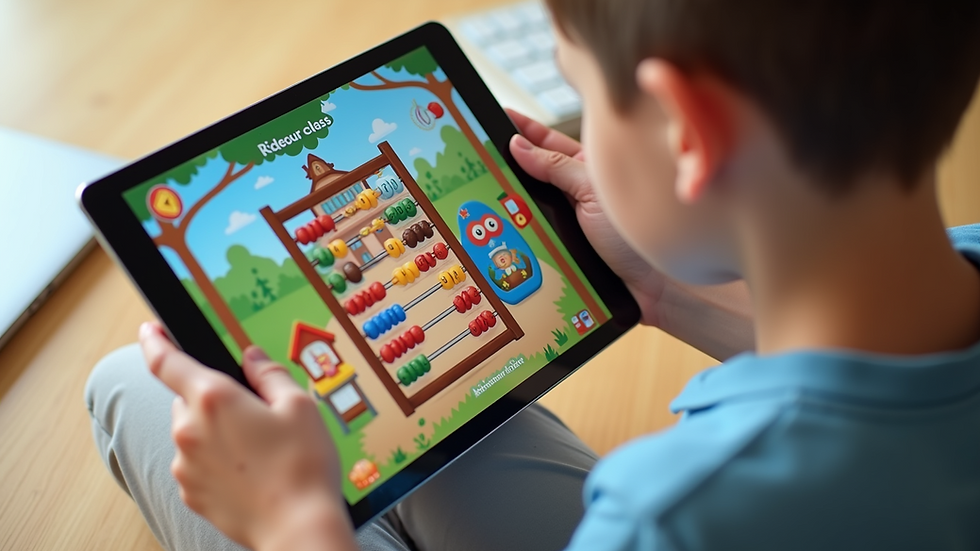How My Kids Elevated Mental Maths Skills with Abacus Classes
- Olivia Stone
- Sep 12
- 4 min read
When I first heard about the benefits of Abacus training, I was curious but a little sceptical. Could moving beads on a frame really help children become faster and more confident at maths? After exploring the world of Abacus and seeing the results firsthand, I’m convinced it’s a fantastic tool for young learners. If you want your child to improve their mental math skills, focus better, and build confidence, Abacus classes might be just what you need.

How Abacus Classes Enhance Mental Math Skills
Abacus training is more than just learning to count with beads. It’s a powerful way to develop mental calculation abilities. When children use an Abacus, they visualise numbers and perform calculations in their mind. This process strengthens their brain’s ability to handle numbers quickly and accurately.
Here’s how Abacus classes help enhance mental math skills:
Improved concentration: Moving beads requires focus, which helps children develop longer attention spans.
Faster calculations: Regular practice trains the brain to perform addition, subtraction, multiplication, and division rapidly.
Better memory: Remembering bead positions and calculation steps boosts working memory.
Visualisation skills: Children learn to picture the Abacus in their mind, which aids mental arithmetic.
Confidence in maths: Success with the Abacus builds a positive attitude towards numbers and problem-solving.
For example, a child who once struggled with simple addition can, after a few months of Abacus training, solve complex sums mentally in seconds. This skill transfers to schoolwork and everyday life, making maths less intimidating and more enjoyable.
If you want to explore this method, consider enrolling your child in Abacus classes. Online classes make it easy to learn from home with expert guidance.

The Science Behind Abacus and Brain Development
You might wonder why Abacus training is so effective. The secret lies in how it engages both sides of the brain. When children use an Abacus, they activate the left brain (logical thinking and numbers) and the right brain (visualisation and creativity). This balanced brain activity enhances overall cognitive development.
Studies show that children trained in Abacus calculation perform better in:
Problem-solving tasks
Logical reasoning
Spatial awareness
Language skills
The repetitive movement of beads also improves hand-eye coordination and fine motor skills. These benefits extend beyond maths, helping children in other academic areas and daily activities.
For parents, this means Abacus classes offer a holistic approach to learning. It’s not just about numbers; it’s about nurturing a sharper, more agile mind.

What are 6 7 8 and 9 called in Abacus?
In Abacus terminology, the numbers 6, 7, 8, and 9 have special names because of how they are represented on the beads. Understanding these names helps children quickly identify and calculate numbers without counting each bead individually.
6 is called "Five and One" because it is represented by one bead in the upper deck (worth five) plus one bead in the lower deck.
7 is "Five and Two" with one bead in the upper deck and two beads in the lower deck.
8 is "Five and Three" combining one bead in the upper deck and three beads in the lower deck.
9 is "Five and Four" with one bead in the upper deck and four beads in the lower deck.
This system helps children perform calculations faster by breaking down numbers into smaller, manageable parts. It also trains their brain to think in terms of combinations rather than individual units.
Knowing these terms is a key step in mastering the Abacus and improving mental math speed.
Tips for Choosing the Right Online Abacus Classes
Choosing the right online Abacus classes can make a big difference in your child’s learning experience. Here are some practical tips to help you find the best fit:
Qualified instructors: Look for teachers with experience in Abacus training and child education.
Interactive sessions: Classes should be engaging, with plenty of practice and feedback.
Small class sizes: Smaller groups or one-on-one sessions ensure personalised attention.
Flexible timing: Online classes should offer schedules that fit your family’s routine.
Progress tracking: Regular assessments help monitor your child’s improvement.
Trial classes: Many providers offer free or discounted trial sessions to test the format.
When I enrolled my child in online Abacus classes, I appreciated the convenience and the ability to watch progress from home. The interactive tools and clear explanations made learning fun and effective.
Remember, consistency is key. Encourage your child to practice regularly, even outside class time, to build strong mental math skills.
Why Online Abacus Classes Are a Great Choice
Online learning has become a popular option for many families, and Abacus classes are no exception. Here’s why online Abacus classes work so well:
Comfort of home: No need to travel, which saves time and reduces stress.
Access to experts: You can connect with top instructors regardless of location.
Flexible learning pace: Children can learn at their own speed with recorded sessions.
Interactive tools: Digital Abacus apps and video lessons enhance understanding.
Safe environment: Learning from home provides a secure and familiar space.
Plus, online classes often include downloadable resources and practice exercises that children can use anytime. This flexibility helps maintain enthusiasm and momentum.
If you want to give your child a head start in maths, online Abacus classes are a smart, modern solution.
Learning Abacus is a journey that opens doors to better mental math skills and sharper thinking. With the right guidance and practice, your child can enjoy the benefits of faster calculations, improved concentration, and greater confidence. Why not explore the possibilities today and see how Abacus training can make a difference?
Ready to get started? Check out Abacus classes and watch your child’s skills soar!

Comments